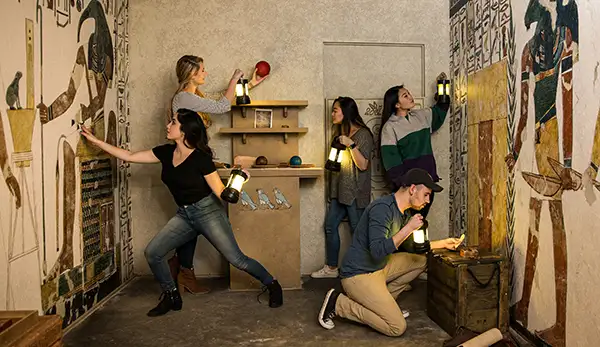Group Approaches: Just How to Team up Efficiently in a Retreat Space
Groups need to proactively pay attention to each participant's insights, assign duties that line up with private strengths, and maintain routine check-ins to guarantee emphasis and avoid redundancy. By cultivating an atmosphere that values communication and versatility, groups can substantially heighten their effectiveness and success rates.
Establish Clear Interaction

To assist in clear interaction, it is essential to mark a central factor of contact for information dissemination. This duty involves summing up findings and recommended methods to make certain everybody continues to be on the exact same page. Furthermore, taking on a systematic technique to conversations can protect against chaotic exchanges. For circumstances, quick, concentrated updates from each team member can maintain the team informed without frustrating them with info.

Appoint Functions Strategically
While clear communication establishes the foundation for efficient teamwork, assigning functions tactically guarantees that each staff member's staminas are made use of successfully. In a retreat space scenario, the time-sensitive and intricate nature of obstacles requires a well-organized strategy to job delegation. By recognizing and leveraging private proficiencies, teams can optimize their analytical capabilities and boost general performance.
Someone with an eager eye for information could excel in discovering concealed things, while a logical thinker can be much better suited to resolving challenges. This duty frequently requires strong organizational and social skills.
2nd, make certain that roles are versatile and versatile. As brand-new obstacles arise, the group has to have the ability to pivot, reapportioning jobs as called for. This adaptability helps keep energy and protects against traffic jams that can take place as a result of inflexible function tasks.
Eventually, a tactical approach to role assignment not only makes the most of the staminas of each group member yet also promotes go a cohesive atmosphere, driving the group in the direction of an effective escape.
Utilize Diverse Abilities
Recognizing and utilizing the varied abilities within your team can substantially raise your efficiency in an escape room. Each staff member brings distinct toughness to the table, and properly leveraging these capabilities can quicken analytical and enhance total efficiency. A group member with strong logical skills could excel at deciphering complicated codes or patterns, while an additional with keen observational capacities might rapidly identify surprise clues that others may forget.
Encourage team members to voice their understandings and concepts promptly, guaranteeing that all prospective options are thought about. Furthermore, assigning tasks that line up with each member's strengths can prevent bottlenecks and ensure that progress is continual.
In addition, variety in skills typically equates to diversity in thinking styles, which is invaluable in a getaway room setup. While some obstacles may call for sensible thinking and precision, others could take click for info advantage of imaginative and lateral reasoning. By identifying and leveraging this variety, teams can resolve a broader series of difficulties better, thus increasing their opportunities of a successful escape.
Manage Time Properly

First, allot first mins for a fast survey of the room. Identify visible puzzles and separate jobs based upon staff member' strengths, guaranteeing that nobody is idle. Establish inner time checkpoints to examine development regularly; for instance, objective to have half the puzzles solved by the mid-point of click site the game. This technique can assist keep the team focused and protect against time from escaping undetected.
Additionally, stay clear of passage vision. If a challenge is taking as well long, rotate employee or proceed to an additional difficulty, returning later with fresh viewpoints. Interaction is vital-- keep every person updated on addressed challenges and staying jobs to prevent repetitive initiatives.
Lastly, make use of any tips or clues moderately however strategically - best escape room. Recognizing when to request for assistance can save beneficial time. By adhering to these time administration concepts, teams can significantly enhance their opportunities of an effective and enjoyable getaway room experience
Debrief and Show
Representation is a necessary aspect of team growth and improvement in the context of getaway areas. Once the difficulty is finished, whether successfully or not, it is critical for the team to engage in an organized debriefing session. This procedure allows staff member to assess their performance, determine staminas, and determine areas for improvement.
Begin the debrief by reviewing what worked out. Highlight specific instances of efficient interaction, analytic, and cooperation. Recognizing these positive habits strengthens them and urges their repetition in future challenges.
Review minutes of complication, miscommunication, or inadequate approaches. Urge an open and positive discussion where group participants can share their viewpoints without concern of objection.
Verdict
In verdict, successful cooperation in an escape room is based upon clear communication, strategic role tasks, the effective utilization of varied skills, and proficient time monitoring. By producing a natural and adaptive team setting, the probability of successfully fixing challenges and achieving the purpose of leaving the room is significantly improved.